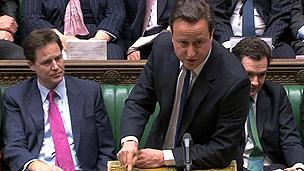David Cameron: UK human rights law review 'imminent'
- Published

Mr Cameron called the court ruling "offensive"
A commission to investigate a British Bill of Rights will be set up "imminently", David Cameron has said.
He told MPs it was about time decisions were made in Parliament, not in courts.
The Conservatives had wanted to replace the Human Rights Act 1998 with a UK Bill of Rights but that was opposed by their Lib Dem coalition partners.
Instead a commission is being set up to look into it. Last week MPs rejected a European Court of Human Rights ruling on giving prisoners the vote.
The vote, prompted by Tory backbencher David Davis and former Labour home secretary Jack Straw, was not binding but could put pressure on ministers to go against the Strasbourg court's ruling.
At Prime Minister's Questions on Wednesday, Mr Cameron responded to Tory MP Phillip Davies who complained about a Supreme Court ruling that sex offenders could appeal against having to register with the police for life. The UK court ruled that the lack of a review was incompatible with the European Convention on Human Rights.
Mr Cameron told MPs Mr Davies "speaks for many people when he says how completely offensive it is to have once again a ruling by a court that seems to fly completely in the face of common sense".
He added: "The commission we are establishing to look at a British bill of rights will be established imminently because I think it's about time we started making sure decisions are made in this Parliament rather than in the courts."
Home Secretary Theresa May said Deputy Prime Minister Nick Clegg and Justice Secretary Ken Clarke would be giving more details shortly.
But she told MPs: "It is time to assert that it is Parliament that makes our laws, not the courts, and that the rights of the public come before the rights of criminals and above all that we have a legal framework that brings sanity to cases such as these."
She was pressed by Conservative MPs Mark Pritchard, Peter Bone and Phillip Hollobone to set a firm timetable for a UK bill of rights.
'Bad people'
Mr Hollobone said his constituents were "fed up to the back teeth with human rights legislation and the way it is being used to promote the rights of bad people, over the rights of good people".
He added: "We really do need to have an early end date so that legislation can be brought to this house in this Parliament, so that this issue can be resolved once and for all."
The Conservatives have been strongly critical of the Human Rights Act - legislation which introduced into British law the principles of the 1950 European Convention on Human Rights - of which Britain was one of the authors.
It was aimed at allowing people to claim the rights enshrined in the Convention without having to go to the European Court of Human Rights in Strasbourg. These include the right to life, the right to family, freedom from torture and the right to a fair trial.
But critics say the act makes it harder for British courts to extradite criminals and has also led the current controversies over prisoners being able to vote and sex offenders having the right to appeal to get their name removed from the sex offenders register.
The Conservatives wanted to replace it with a British Bill of Rights but have stressed this would not mean withdrawing from the European Convention on Human Rights.
Mr Cameron said in 2006 he wanted to "entrench" a British bill of rights, which would outline "core values" and responsibilities, in British law - so it could not be overturned in the Commons.
He said a "clear and codified" bill would allow the European Court of Human Rights to apply a "margin of appreciation" in its rulings - where judges are obliged to take into account the cultural, historic and philosophical differences between Strasbourg and the nation in question.
The coalition deal says the commission will look into a British Bill of Rights "that incorporates and builds on all our obligations under the European Convention on Human Rights, ensures that these rights continue to be enshrined in British law, and protects and extends British liberties".
Labour had looked at having a Bill of Rights and Responsibilities as the basis of a written constitution - the then Justice Secretary Jack Straw believed a written statement of "common values" would help social cohesion.
- Published10 February 2011
- Published25 January 2011